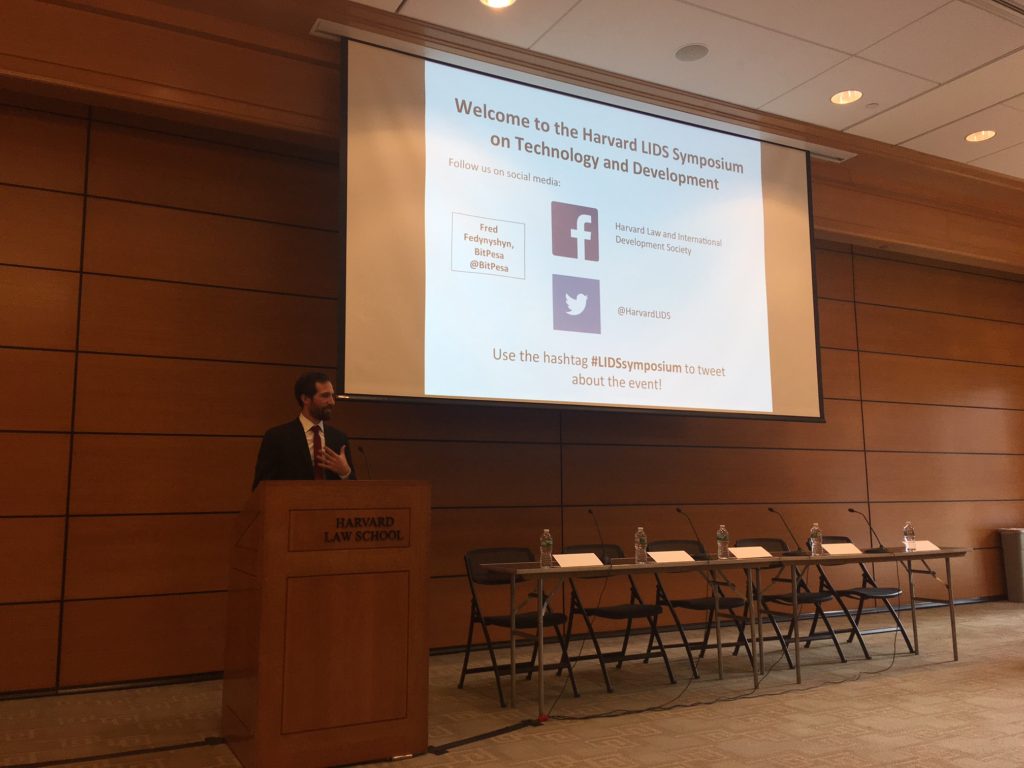By: Michael Maruca
Fred Fedynyshyn opened the LIDS Fall Symposium on Technology and Development last Friday, October 21. Fedynyshyn is Chief Legal and Compliance Officer at BitPesa, a payment transfer service that wields mobile money and bitcoin technology to facilitate cross-border payments into and out of Africa. Drawing a historical line from the development of the plow to credit innovations in fintech, Fedynyshyn spoke of how technology is the best way to drive human development.
According to Fedynyshyn, lawyers entering the international development space need to master three things: 1) engaging with government; 2) harnessing the power of the private sector; and 3) understanding the nature of regulation.
Development is inherently political, and most lawyers in the field will operate in heavily regulated industries. Therefore, cultivating a relationship with governments is key, as is understanding their concerns and priorities. In addition to cooperating with low-income country governments, the development lawyer should engage with those countries that set the rules governing activity in their industry.
Fedynyshyn described some of the advantages the private sector has over traditional development agencies. While USAID and development banks are good at long term thinking, identifying priority areas, creating a forum for access to regulators, and providing of credibility and legitimacy, it is the private sector that drives development forward. The private sector tends towards efficiency, may be more willing to take risks, is customer focused, and capable of quick pivots.
However, while the private sector provides an energizing force for technology in development, Fedynyshyn emphasized the need to wield regulation intelligently, a theme that continued throughout the symposium. Smart regulation engages all relevant stakeholders, addresses antitrust issues, internalizes externalities, and takes the long view, since development happens over decades, not quarters. Fedynyshyn spoke of how lawyers in development should take an outcome-focused approach to drafting regulation. They should avoid hyperbole and think calmly about the costs and the benefits as well. This can be a difficult analysis to do, particularly with scarce data. Furthermore, lawmakers in developed countries might be writing the rules for the rest of the world without really understanding how the law can or cannot be implemented on the ground. This disconnect might also occur within low-income countries, as the urban elites are unaware of the difficulties in implementation of laws in rural communities.
Over the course of his keynote speech, Fedynyshyn advised that aspiring international development lawyers in the private sector should be intellectually, emotionally, and financially prepared for the regulatory practice necessary to succeed. Fedynyshyn closed the opening speech on an optimistic note, highlighting some of the themes that tied the other panels together: smart regulation, creating innovation, and the role of ethical concerns in technological development.
About the guest blogger: Mike Maruca is a DC native who came to HLS via Yale and the Peace Corps. He briefly worked as a policy analyst at the OECD Development Centre and plans on practicing in the international development field. He is interested in energy, health, education, and social enterprise in Africa.
Follow Harvard Law and International Development Society on Facebook and Twitter (@HarvardLIDS).

